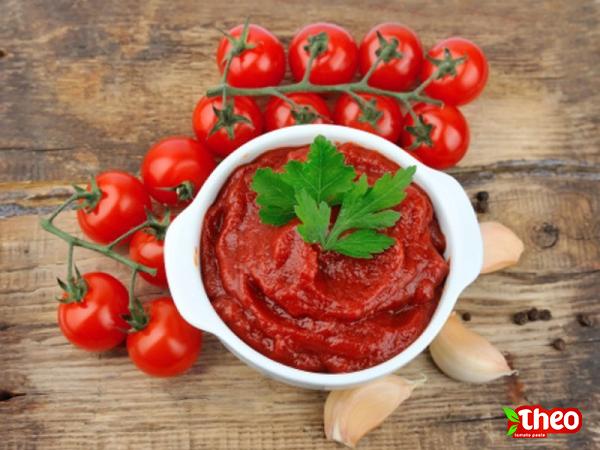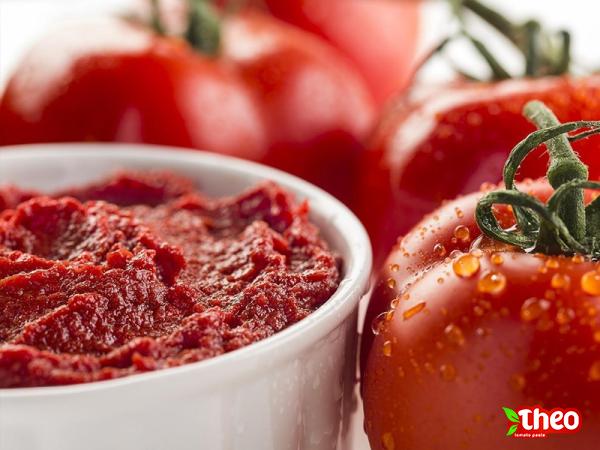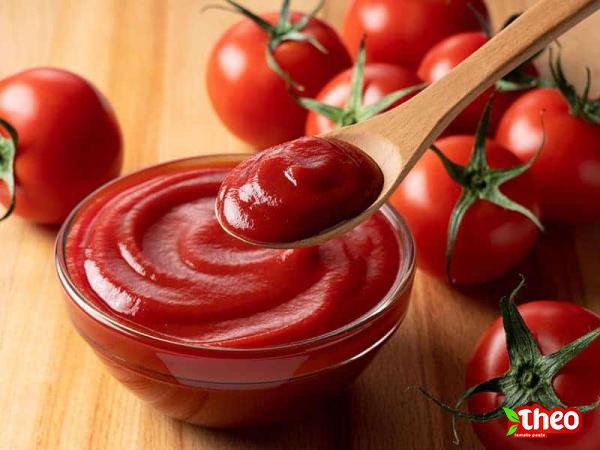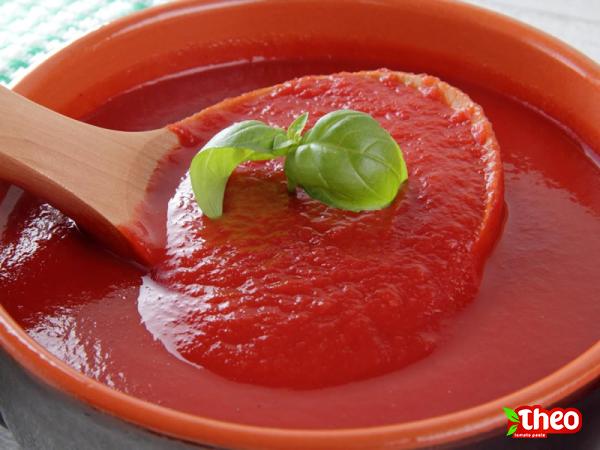The Magic of Pasta Sauce: Unlocking the Flavors of Tomato Paste Pasta, one of the most versatile and loved dishes around the world, owes much of its appeal to the magic of pasta sauce. At the heart of a great pasta sauce is the humble tomato paste. From its rich flavor profile to its thick consistency, tomato paste forms the base of countless pasta sauce recipes, delivering a punch of taste and texture that can elevate any pasta dish. Tomato paste is made by slow-cooking tomatoes for hours, reducing them to a concentrated form. This process removes the excess water content from the tomatoes, leaving behind a thick paste that is bursting with the natural flavors of the fruit. Although the production of tomato paste involves some basic techniques, it is the quality of the tomatoes used that truly determine the end result. One of the primary advantages of using tomato paste in pasta sauce is the intensity of flavor it imparts. The slow cooking process enhances the sweetness and tanginess of the tomatoes, resulting in a deep and robust taste that adds complexity to any dish. This concentrated flavor is further enhanced by the addition of herbs, spices, and other ingredients, creating a sauce that tantalizes the taste buds. The thick consistency of tomato paste also plays a crucial role in pasta sauce. Unlike fresh tomatoes, which contain a high water content, tomato paste is concentrated, allowing it to hold its shape and thickness when combined with other ingredients. This attribute is particularly appealing when making rich, hearty sauces, as it provides a velvety texture that clings to the pasta, ensuring every bite is packed with flavor. One of the beauties of tomato paste is its versatility. It can be used as the star ingredient in a classic marinara sauce or combined with other elements to create more elaborate pasta sauce variations. Its concentrated nature allows it to stand up to potent ingredients like garlic, onions, and spices, creating a well-balanced combination of flavors. When making a pasta sauce from tomato paste, there are endless possibilities for customization. Spices like oregano, basil, and thyme can be utilized to add depth and aroma to the sauce. Garlic and onions can be sautéed to provide a savory base, while other vegetables like mushrooms, bell peppers, or carrots can be incorporated to enhance texture and taste. Further variations can be achieved by including proteins such as ground meat, sausage, or shredded chicken. Adding cheese, such as Parmesan or mozzarella, creates a creamy and luscious texture. For those seeking a touch of heat, chili flakes or cayenne pepper can be included to give the sauce a spicy kick.

tomato paste
 One popular example of pasta sauce made from tomato paste is the Bolognese sauce. This rich and meaty sauce features a base of tomato paste, combined with ground meat, onions, garlic, carrots, and celery. Slowly simmered with a touch of wine and herbs, the Bolognese sauce gains complexity over time, resulting in a full-bodied and deeply satisfying addition to any pasta dish. Another classic tomato paste-based pasta sauce is the marinara sauce. Simplicity is the key to this sauce, which typically includes tomato paste, diced tomatoes, garlic, onions, and herbs. The result is a bright and vibrant sauce that complements a wide range of pasta shapes, from spaghetti to penne. For those looking for a creamy pasta experience, tomato paste can be used as a base for a tomato cream sauce. This indulgent sauce combines tomato paste with heavy cream, garlic, onions, and herbs to create a luxurious and velvety texture. When tossed with pasta, it forms a heavenly combination that satisfies both taste and texture cravings. With the explosion of dietary preferences and restrictions, tomato paste-based pasta sauces can be easily adapted to meet various needs. Those following a vegetarian or vegan diet can omit meat and cheese but still enjoy the rich flavors of tomato paste combined with a variety of vegetables, herbs, and spices. Gluten-free pasta can also be paired with tomato paste-based sauces to create a delicious and inclusive meal. In conclusion, tomato paste is the unsung hero behind many delectable pasta sauces. Its concentrated flavor and thick consistency provide the foundation for remarkable culinary creations. From simple marinara to robust Bolognese, the possibilities for pasta sauce made from tomato paste are endless. So, why settle for bland and uninspiring pasta dishes when the magic of tomato paste can transform your meals into culinary masterpieces? Embrace the power of tomato paste and unlock the flavors that await you in your next pasta adventure.The Business Potential of Pasta Sauce Made from Tomato Paste
One popular example of pasta sauce made from tomato paste is the Bolognese sauce. This rich and meaty sauce features a base of tomato paste, combined with ground meat, onions, garlic, carrots, and celery. Slowly simmered with a touch of wine and herbs, the Bolognese sauce gains complexity over time, resulting in a full-bodied and deeply satisfying addition to any pasta dish. Another classic tomato paste-based pasta sauce is the marinara sauce. Simplicity is the key to this sauce, which typically includes tomato paste, diced tomatoes, garlic, onions, and herbs. The result is a bright and vibrant sauce that complements a wide range of pasta shapes, from spaghetti to penne. For those looking for a creamy pasta experience, tomato paste can be used as a base for a tomato cream sauce. This indulgent sauce combines tomato paste with heavy cream, garlic, onions, and herbs to create a luxurious and velvety texture. When tossed with pasta, it forms a heavenly combination that satisfies both taste and texture cravings. With the explosion of dietary preferences and restrictions, tomato paste-based pasta sauces can be easily adapted to meet various needs. Those following a vegetarian or vegan diet can omit meat and cheese but still enjoy the rich flavors of tomato paste combined with a variety of vegetables, herbs, and spices. Gluten-free pasta can also be paired with tomato paste-based sauces to create a delicious and inclusive meal. In conclusion, tomato paste is the unsung hero behind many delectable pasta sauces. Its concentrated flavor and thick consistency provide the foundation for remarkable culinary creations. From simple marinara to robust Bolognese, the possibilities for pasta sauce made from tomato paste are endless. So, why settle for bland and uninspiring pasta dishes when the magic of tomato paste can transform your meals into culinary masterpieces? Embrace the power of tomato paste and unlock the flavors that await you in your next pasta adventure.The Business Potential of Pasta Sauce Made from Tomato Paste
Specifications of tomato paste
 1. Growing Consumer Demand: The market for pasta sauce made from tomato paste has witnessed significant growth in recent years. With the increasing popularity of Italian cuisine and the rise in international food trends, consumers are seeking convenient and flavorful options for pasta sauces. Tomato paste provides a flavorful and versatile base for pasta sauce, making it a sought-after ingredient. 2. Health Conscious Consumers: Tomato paste-based pasta sauce offers a healthier alternative to many commercially available pasta sauces that are laden with preservatives, added sugars, and artificial flavors. Consumers today are becoming more health-conscious and are actively seeking out products that are made with natural, clean ingredients. Tomato paste-based pasta sauces are often free of artificial additives, making them an attractive choice for health-conscious individuals. 3. Convenience and Time-Saving: Tomato paste-based pasta sauces offer convenience to those who love homemade pasta but may not have the time or skills to prepare complex sauces from scratch. With tomato paste, consumers can easily whip up a flavorful sauce in minutes by simply adding their favorite ingredients and allowing it to simmer. This convenience factor appeals to busy individuals and families who desire a quick and tasty meal option. 4. Versatility in Culinary Applications: While primarily used in pasta sauces, tomato paste made from pasta has versatile applications across various culinary settings. It can be used as a base for soups, stews, or even as a flavor enhancer in marinades and dressings. Its concentrated flavor profile and thick consistency impart depth and richness to a wide range of dishes, making it a favorite among chefs and home cooks alike. 5. Opportunities for Private Label Brands: The popularity of pasta sauce made with tomato paste presents an opportunity for private label brands to enter the market. Private label brands can create their unique line of pasta sauces, capitalizing on the growing demand for tomato paste-based options. By offering quality tomato paste sauces at competitive prices, private label brands can establish a foothold in the pasta sauce market and cater to specific consumer preferences. 6. Cross-Promotion with Pasta Companies: Collaborations and cross-promotion between pasta sauce manufacturers and pasta companies can yield mutual benefits. Co-branded initiatives, wherein pasta companies promote specific pasta sauces made from tomato paste, can increase awareness and consumer interest. By highlighting the compatibility and complementary flavors between their pasta products and the pasta sauces, companies can create a synergy that drives sales and strengthens their market presence.
1. Growing Consumer Demand: The market for pasta sauce made from tomato paste has witnessed significant growth in recent years. With the increasing popularity of Italian cuisine and the rise in international food trends, consumers are seeking convenient and flavorful options for pasta sauces. Tomato paste provides a flavorful and versatile base for pasta sauce, making it a sought-after ingredient. 2. Health Conscious Consumers: Tomato paste-based pasta sauce offers a healthier alternative to many commercially available pasta sauces that are laden with preservatives, added sugars, and artificial flavors. Consumers today are becoming more health-conscious and are actively seeking out products that are made with natural, clean ingredients. Tomato paste-based pasta sauces are often free of artificial additives, making them an attractive choice for health-conscious individuals. 3. Convenience and Time-Saving: Tomato paste-based pasta sauces offer convenience to those who love homemade pasta but may not have the time or skills to prepare complex sauces from scratch. With tomato paste, consumers can easily whip up a flavorful sauce in minutes by simply adding their favorite ingredients and allowing it to simmer. This convenience factor appeals to busy individuals and families who desire a quick and tasty meal option. 4. Versatility in Culinary Applications: While primarily used in pasta sauces, tomato paste made from pasta has versatile applications across various culinary settings. It can be used as a base for soups, stews, or even as a flavor enhancer in marinades and dressings. Its concentrated flavor profile and thick consistency impart depth and richness to a wide range of dishes, making it a favorite among chefs and home cooks alike. 5. Opportunities for Private Label Brands: The popularity of pasta sauce made with tomato paste presents an opportunity for private label brands to enter the market. Private label brands can create their unique line of pasta sauces, capitalizing on the growing demand for tomato paste-based options. By offering quality tomato paste sauces at competitive prices, private label brands can establish a foothold in the pasta sauce market and cater to specific consumer preferences. 6. Cross-Promotion with Pasta Companies: Collaborations and cross-promotion between pasta sauce manufacturers and pasta companies can yield mutual benefits. Co-branded initiatives, wherein pasta companies promote specific pasta sauces made from tomato paste, can increase awareness and consumer interest. By highlighting the compatibility and complementary flavors between their pasta products and the pasta sauces, companies can create a synergy that drives sales and strengthens their market presence.
buy tomato paste
 7. Capitalizing on Regional Flavors: The versatility of tomato paste-based pasta sauces allows for the infusion of various regional flavors and ingredients, appealing to consumers seeking unique culinary experiences. Pasta sauce manufacturers can develop region-specific sauces, incorporating local ingredients and flavors to cater to diverse palates. This strategy allows brands to tap into niche markets and stand out from competitors by offering authentic and distinctive flavors. 8. Premium and Gourmet Offerings: For discerning consumers willing to invest in high-quality, gourmet food products, premium pasta sauces made from tomato paste can be a lucrative offering. Brands can develop artisanal varieties, highlighting unique blends of spices, high-quality tomatoes, and premium ingredients. By positioning these sauces as gourmet choices and utilizing premium packaging, brands can command higher price points and target a niche market segment. 9. Online Retail Opportunities: The rise of e-commerce and online grocery shopping presents an avenue for pasta sauce manufacturers to reach a wider audience. By establishing a strong online presence and offering a variety of tomato paste-based pasta sauces through online marketplaces and their dedicated websites, brands can expand their customer base beyond traditional brick-and-mortar stores. Utilizing social media platforms can also help build brand awareness and engage with consumers directly. 10. Culinary Partnerships: Collaborating with renowned chefs and culinary influencers presents a unique opportunity for pasta sauce manufacturers to leverage their expertise and reputation. By partnering with experts in the culinary field, pasta sauce brands can create exclusive recipes, host cooking demonstrations, and showcase the versatility of their tomato paste-based sauces. These partnerships can generate excitement around the brand and drive sales as consumers aspire to recreate the dishes they see. 11. Packaging Innovation: In the highly competitive pasta sauce market, packaging plays a significant role in attracting consumers. Pasta sauce manufacturers can explore innovative packaging solutions that not only enhance the product’s shelf life but also provide convenience and ease of use. Squeeze bottles, resealable pouches, and portion-controlled packaging options can appeal to consumers looking for practical and mess-free options. 12. Sustainable Initiatives: As consumer awareness of sustainability and environmental impact continues to grow, pasta sauce manufacturers can implement eco-friendly practices in their production and packaging processes. Utilizing sustainable packaging materials, supporting responsible sourcing of tomatoes, and implementing energy-efficient manufacturing practices can position brands as responsible stewards of the environment, further enhancing their reputation and appealing to eco-conscious consumers. In conclusion, the business potential of pasta sauce made from tomato paste is vast and varied. From catering to health-conscious consumers to capitalizing on convenience and flavor demands, tomato paste-based pasta sauces offer a range of opportunities for brands and entrepreneurs. By leveraging culinary creativity, developing unique flavor profiles, and exploring strategic partnerships, businesses can tap into the growing market for pasta sauce made from tomato paste, fueling growth and success in the dynamic food industry.
7. Capitalizing on Regional Flavors: The versatility of tomato paste-based pasta sauces allows for the infusion of various regional flavors and ingredients, appealing to consumers seeking unique culinary experiences. Pasta sauce manufacturers can develop region-specific sauces, incorporating local ingredients and flavors to cater to diverse palates. This strategy allows brands to tap into niche markets and stand out from competitors by offering authentic and distinctive flavors. 8. Premium and Gourmet Offerings: For discerning consumers willing to invest in high-quality, gourmet food products, premium pasta sauces made from tomato paste can be a lucrative offering. Brands can develop artisanal varieties, highlighting unique blends of spices, high-quality tomatoes, and premium ingredients. By positioning these sauces as gourmet choices and utilizing premium packaging, brands can command higher price points and target a niche market segment. 9. Online Retail Opportunities: The rise of e-commerce and online grocery shopping presents an avenue for pasta sauce manufacturers to reach a wider audience. By establishing a strong online presence and offering a variety of tomato paste-based pasta sauces through online marketplaces and their dedicated websites, brands can expand their customer base beyond traditional brick-and-mortar stores. Utilizing social media platforms can also help build brand awareness and engage with consumers directly. 10. Culinary Partnerships: Collaborating with renowned chefs and culinary influencers presents a unique opportunity for pasta sauce manufacturers to leverage their expertise and reputation. By partnering with experts in the culinary field, pasta sauce brands can create exclusive recipes, host cooking demonstrations, and showcase the versatility of their tomato paste-based sauces. These partnerships can generate excitement around the brand and drive sales as consumers aspire to recreate the dishes they see. 11. Packaging Innovation: In the highly competitive pasta sauce market, packaging plays a significant role in attracting consumers. Pasta sauce manufacturers can explore innovative packaging solutions that not only enhance the product’s shelf life but also provide convenience and ease of use. Squeeze bottles, resealable pouches, and portion-controlled packaging options can appeal to consumers looking for practical and mess-free options. 12. Sustainable Initiatives: As consumer awareness of sustainability and environmental impact continues to grow, pasta sauce manufacturers can implement eco-friendly practices in their production and packaging processes. Utilizing sustainable packaging materials, supporting responsible sourcing of tomatoes, and implementing energy-efficient manufacturing practices can position brands as responsible stewards of the environment, further enhancing their reputation and appealing to eco-conscious consumers. In conclusion, the business potential of pasta sauce made from tomato paste is vast and varied. From catering to health-conscious consumers to capitalizing on convenience and flavor demands, tomato paste-based pasta sauces offer a range of opportunities for brands and entrepreneurs. By leveraging culinary creativity, developing unique flavor profiles, and exploring strategic partnerships, businesses can tap into the growing market for pasta sauce made from tomato paste, fueling growth and success in the dynamic food industry.




